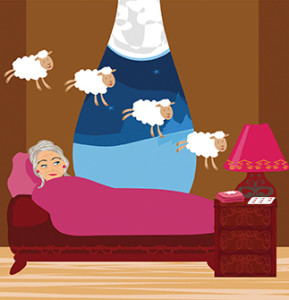Reasons and solutions for sleeplessness
Posted on February 28, 2015 by bob in In Every Life
The arrival of March signals increases of blooms and birds to our area, but also brings Daylight Saving Time changes. The need to  “Spring Forward” to be congruent with others can actually alter our sleep patterns. Many people find it difficult to awaken for a week or more after the time change.
“Spring Forward” to be congruent with others can actually alter our sleep patterns. Many people find it difficult to awaken for a week or more after the time change.
Several types of cardiac or respiratory changes impact sleep. If you experience frequent awakenings or awaken with a headache, it may indicate issues such as sleep apnea. Other conditions that commonly interfere with sleep include gastric reflux, restless leg syndrome, pain from degenerating peripheral nerves, joints, or muscle strains. Endocrine and hormonal changes and their effects alter sleep patterns, as can emotional or cognitive changes.
Emotional changes and depression alter sleep, often the deep rapid eye movement (REM) sleep. The key is to have an accurate diagnosis and treatment of any underlying issue. However, many medications have side effects of sleep alterations, so discuss all medications, including over-the-counter (OTC) or herbal preparations with your health care provider.
Corticosteroids and bronchodilators are examples of medications that prevent can prevent sleep. Some individuals attempt to self-medicate with over the counter preparations such as antihistamines, decongestants, or cough suppressants. Recent research is evaluating links between some OTC medications (specifically Benadryl and dextromethorphan) with risks for cognitive changes or falls. Medications for sleep may help a person fall asleep but not address the issue of remaining asleep that is more frequently experienced by older adults. Additionally, use of sleep aids should be evaluated at each visit for risks vs. benefits, as effectiveness may wane after a few weeks.
Non-pharmacological suggestions for improving sleep patterns include:
1. Establish regular sleep and wake patterns each day of the week.
2. Avoid daytime naps that can interfere with your sleep patterns.
3. Create a “wind-down” ritual, sometimes termed sleep hygiene.
4. Keep the room in which you sleep free of clutter and distractions.
5. Assure your mattress is conducive to your rest and sleep.
6. Keeping the bedroom calm can help condition you for sleep. Consider if watching action-packed or upsetting TV or movies, or using the area for work is helping or hindering your sleep.
7. Exercise earlier in the day than prior to sleep to avoid increasing your metabolism at the time you wish to wind down.
8. Avoid nicotine and caffeine. Check prescription and over the counter medications for any caffeine content.
9. Avoid alcohol for four to six hours before bed. It may hasten falling asleep, but impedes the quality and depth of sleep.
10. Avoid eating heavy meals prior to sleeping, especially foods high in protein, fat or spices that may be more difficult to digest.
11. A small bedtime snack of foods high in tryptophan (milk, nuts, bananas, eggs, honey) or carbohydrates may help prevent hunger from causing awakenings.
12. Avoid fluid intake two to four hours prior to bedtime.
Many factors influence sleep patterns, yet some alterations in activities may have significant impact on your sleep. Consider these as you adapt to Daylight Savings Time. Sleep well and have a Happy Spring!
(For more information, visit http://www.emedicinehealth.com/slideshow_10_tips_avoid_insomnia/article_em.htm)
Arlene H. Morris, EdD, RN, CNE, is Professor of Nursing, Auburn Montgomery School of Nursing, and Immediate Past President of the AL State Nurses Association. Reach her at amorris@aum.edu.










